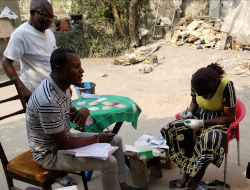The question kept coming up: Why are some countries in the grip of COVID-19 while others appear less affected?
“It’s fundamentally curious,” said Rhoel Dinglasan, Ph.D., M.P.H., a professor of infectious diseases with the University of Florida College of Veterinary Medicine, part of UF Health, the university’s academic health center. “It seems like COVID-19 is not affecting people in Africa as severely as it has in North America. But why?”
Dinglasan suspects the answer is connected to people’s exposure to various infectious diseases in specific geographic regions.
The U.S. Centers for Disease Control and Prevention recently awarded a $10 million grant to a team led by Dinglasan to test this hypothesis and explore other factors that can influence COVID-19 severity. Other investigators from UF include John Lednicky, Ph.D., a professor in the College of Public Health and Health Professions; Piyush Jain, Ph.D., an assistant professor of chemical engineering in the Herbert Wertheim College of Engineering; and Sadie Ryan, Ph.D., an associate professor of medical geography in the College of Liberal Arts and Sciences.
The team and its international collaborators will study the current and past history of exposure to the SARS-CoV-2 virus and its genetic variants that cause COVID-19 in two African countries, along with other factors. The project will also use engineered CRISPR-based genetic tests for detecting SARS-CoV-2 and other pathogens. The Democratic Republic of Congo and Nigeria have so far reported fewer infections and deaths due to COVID-19 compared with heavily affected western countries, Dinglasan said. The researchers will coordinate closely with the Africa Centres for Disease Control and Prevention to characterize host and pathogen features that differentiate the pandemic experience of the United States and sub-Saharan countries.
Dinglasan, who is also affiliated with the UF Emerging Pathogens Institute, is well acquainted with human and zoonotic diseases that are endemic to sub-Saharan Africa. His work has primarily focused on vector-borne diseases, such as malaria and arboviruses like West Nile, dengue and Zika.

